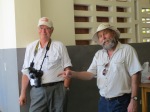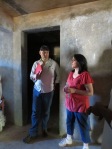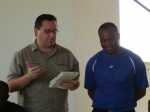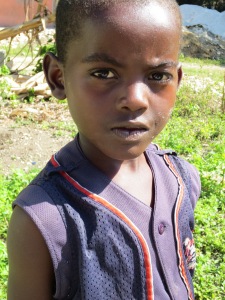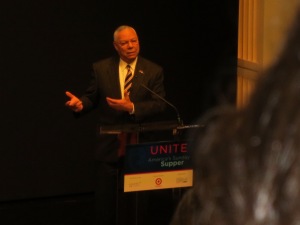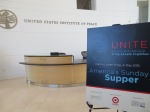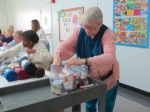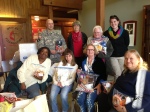Message given at Sixty-First Avenue UMC, Nashville, Tennessee
When my daughter started 1st grade, the school allowed parents to walk the child to their classroom on the first day. When I got there, Marissa wouldn’t turn loose of my hand! Each time I tried to leave, she started to cry out, so I just stayed there. While the teacher took roll, while she began lessons, up until recess. We walked outside and I was trying to tell her that she would be ok without me. A little girl who had just moved to Mississippi from Mexico came up and without saying a word, pried Marissa’s fingers off my hand and taking Marissa’s hand, led her to the playground.
Have you ever suffered a problem that nobody seemed to understand? You may feel lonely and alone and frightened, even isolated. And then one person comes along who has experienced something similar themselves and suddenly you don’t feel alone anymore. Cinthia, the little girl from Mexico, knew what it was like to be scared in a new place and she understood what Marissa was feeling. She was in a position to help her like none of the other kids or even me, her mother, could.
A shared experience among people who are suffering is powerful. That’s why Alcoholics Anonymous, Narcotics Anonymous and other similar groups often see powerful results…people who understand can help each other get to the next place in life.
Tonight we recognize World AIDS Day as we celebrate the first week of Advent. Tonight, we recognize that there are human beings among us, who understand our sufferings – and that Christ Jesus, who came and lived as God with us – Emmanuel – not only understands, but has broken through to the other side – so that one day all these present sufferings can be transformed to beauty. When we walk alongside Christ and those who seek to live in His light, everything changes.
According to the aids.gov website, “1 million are living with HIV in the U.S., 1 in 5 are living with HIV without knowing it, and 1 in 4 new HIV infections is among youth ages 13-24. Globally, 33.4 million are living with HIV/AIDS. While cases have been reported in all regions of the world, almost all those living with HIV (97%) reside in low- and middle-income countries, particularly in sub-Saharan Africa.”
AIDS is a preventable, treatable disease, but a lack of awareness, knowledge and good practice has been at the root of its spread. I’d like to share a video now about the impact of AIDS on children in Africa, and how their newfound community has impacted their lives.
Watch this video: http://www.youtube.com/watch?v=LjgF0u7Y3fU
Purity – the young girl in the video – found someone to help her – to walk alongside her – who understood her plight, and it impacted not only her life – but that of her whole community. Having someone who understands walk alongside you can make all the difference in the world. It can impact the path you take, the things you do along that path, and it can even build your character – the essence of who you are meant to be.
Tonight’s Scripture gives us a vision of what can happen when we walk alongside God:
Isaiah 2 1-5 The Message Isaiah got regarding Judah and Jerusalem:
There’s a day coming
when the mountain of God’s House
Will be The Mountain—
solid, towering over all mountains.
All nations will river toward it,
people from all over set out for it.
They’ll say, “Come,
let’s climb God’s Mountain,
go to the House of the God of Jacob.
He’ll show us the way he works
so we can live the way we’re made.”
Zion’s the source of the revelation.
God’s Message comes from Jerusalem.
He’ll settle things fairly between nations.
He’ll make things right between many peoples.
They’ll turn their swords into shovels,
their spears into hoes.
No more will nation fight nation;
they won’t play war anymore.
Come, family of Jacob,
let’s live in the light of God.
This vision of how life will be impacts the individual and the community. For the individual, the vision is God: “show[ing] us the way he works so we can live the way we’re made.”
We’re made in the image of God. We’re made to be loving, grace-filled, gift-bearing, obstacle-overcoming, community-driven, creation-building creatures! Each and every one of us! When we walk alongside God, we can live that way – the way we’re made.
Have you ever had a problem with a piece of equipment that had to be reset back to manufacturer’s settings? Maybe it got bogged down with too many programs and didn’t have enough memory to operate! Sometimes we’re like that! We have to be reset to manufacturer’s settings so we can operate the way we were made to…in the image of God.
This Scripture also speaks to how we will live in community when we walk together alongside God: They’ll turn their swords into shovels, their spears into hoes. No more will nation fight nation; they won’t play war anymore.
Can you imagine no more war? Can you imagine the millions and trillions of dollars spent the world over making machines of war, instead making machines that create life? Food, shelter, education, health, meaningful work?
The Christian faith is based on God who created the universe, loved humanity so much, that when sin separated God from human, God sent Christ to become human – showing us the way that we should live – and overcoming death so that nothing could separate us from God again. Christians are people of hope, because if death can be conquered, isn’t all else possible?
Advent is that time of year that we think about God becoming human. God leaving the perfection of heaven to enter the realm that we live in – to experience the things we experience.
The lady I stayed with in the Philippines is from Seattle, Washington and she told me about a time when ladies from Africa came to stay with her. She said that their reaction to her home was interesting. The lady said, “Kristin – your home is so beautiful. You have a beautiful house, food, a lovely family. If I lived here, I would never leave. Why would you come to Africa?”
We can ask God the same question – why would you have left Heaven to come here? Why would you want to experience the pain and suffering of others? Why would you put yourself in that position?
The answer is the same. Love. Love can take you to difficult places. And God loves you so much that God bears that pain. God’s love is beyond any love we can conceive. We see glimpses of it through stories from ZOE Ministry – where families are based on blood relatives, but on the blood of Christ that creates new family that walks alongside through pain and joy. We see glimpses of this love through people like Kristin who leaves the comfort of her home to go to uncomfortable places and be in ministry with strangers. We see glimpses of this love here at 61st Avenue – where people are planning and preparing to bring Christmas joy to children we may not meet till we all get to Heaven. But all the love we experience here, is just a fraction of the love that God has for us – it’s not dependent on us looking a certain way, speaking a certain language, living in a certain neighborhood or country, or being free of infectious diseases. God’s love blankets the world and includes you – no matter how unlovable you may feel at times. It’s a free gift…all we have to do is open our hearts and our hands.
Tonight we begin the walk towards the manger. It’s a walk that we don’t need to take alone. Remember – who we walk with can impact the direction we go, the things we do, and the character we become. During this period before December 25, commit to walking with the church. Praying and reading Scripture daily. Practicing the actions of the person you want to become. God will be with you in your practice, God will walk alongside.
